Detroit Lions film review: Five observations vs. Chicago Bears
 Justin Rogers
Justin Rogers
Allen Park — Without quarterback Matthew Stafford for the first time in more than eight years, the Detroit Lions lost for the fifth time in the past six games, falling on the road to the Chicago Bears, 20-13.
Win, lose, or heaven forbid, another draw, we're going to continue to review the tape from each games every Tuesday to see what we can learn. So buckle up for another film study.
Driskel report
Stafford was replaced in the lineup by Jeff Driskel, a former sixth-round pick who started five games with the Cincinnati Bengals a year ago. And while there's been a reasonable amount of hand-wringing about the team's backup situation, given Stafford's mounting injuries in recent years, there were some things to really like about Driskel's performance and potential longer-term fit for the role.
First, his mobility is exciting, and a valuable change-of-pace trait to have in a backup. The film confirms Driskel rarely panicked in the pocket, typically relying on his feet only as a last resort. That's important for an NFL quarterback, who can quickly get in trouble (or hurt) if he's too scramble-happy.
As for accuracy, no one will confuse Driskel for Drew Brees, but in this one game he was at least as accurate as Stafford, connecting on the majority of his short throws, while showing the ability to put it on a spot deep down the field.
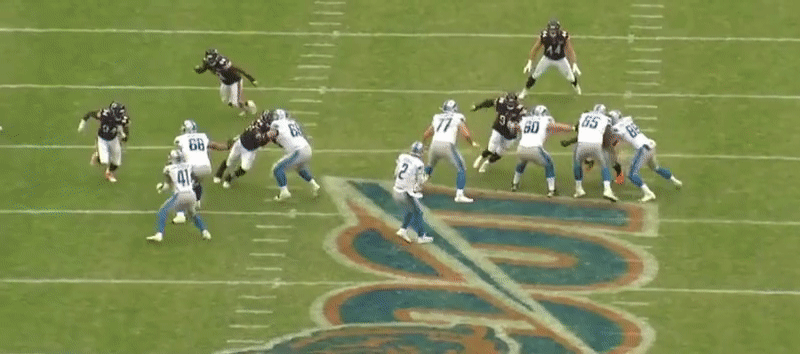
Driksel's sub-60 percent completion percentage was hindered by multiple drops. He was also robbed on of some completions, including a 27-yarder to Danny Amendola, that were wiped out by penalties.
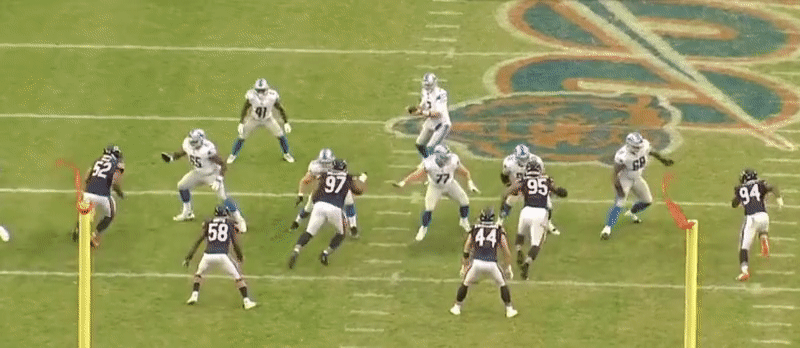
Back to the mobility. Driskel showed an array of abilities within that skill set, from being able to make defenders miss in the pocket, to scrambling for first downs to throwing on the move.

Twice Driskel threw across his body into a tight window while rolling away from pressure, a difficult throw for even the most experienced passer.
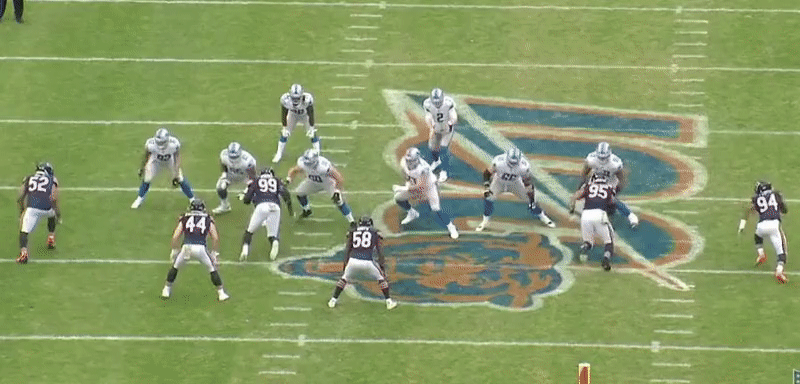
Where Driskel needs development is with his eyes. When he got into trouble Sunday, it was because he was locking on to his target, giving the defense an easy read.
In the second quarter, not only did he try to force a pass that wasn't there to Kenny Golladay, the fact Driskel never took his eyes off the intended target allowed linebacker Nick Kwiatkoski to follow the quarterback's gaze and undercut the route for an interception.
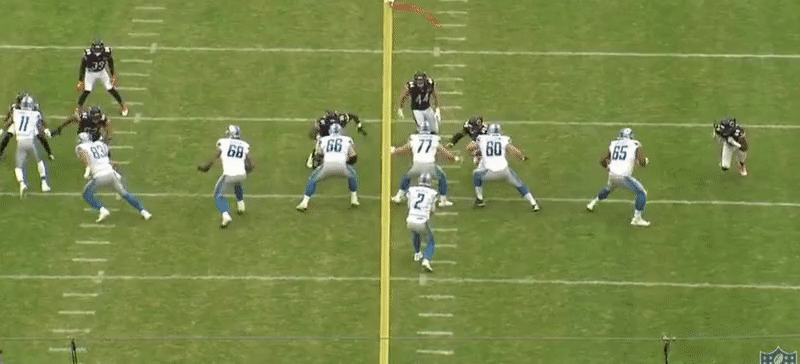
It almost happened again on Driskel's next pass. While clearly zeroed in on tight end T.J. Hockenson running a short out pattern, cornerback Kyle Fuller came inches away from stepping in front of the pass for a pick-six.
Run woes continue
For weeks we were told the Lions were one block away on most running plays, and the film often confirmed that, but nine games into the season, the problems have not been corrected and seemingly aren't improving.
Without a doubt the Bears present a tough run defense, allowing opponents to average just 3.7 yards per carry. So maybe we shouldn't be surprised the Lions consistently struggled to open up any lanes for their trio of backs.
The team's longest carry came on the first play of the game, when Ty Jonson gained 10 yards off a zone read. After that, the backs averaged 2.9 yards per attempt.

Compared to many opponents, the Lions get little push up front and holes are rarely there for the ball carriers. Sure, a star back like Saquon Barkley or Ezekiel Elliott could do more than Detroit's current collective, but there's a reason Kerryon Johnson's yards per carry plummeted from 5.4 yards to 3.3 prior to his injury.
I don't have enough information to tell you whether this is a coaching or personnel problem. It's tough to move an NFL defensive lineman, but you can see the opposition managing to do it on a weekly basis, so it raises questions about the strength and conditioning program in Allen Park, as well as the techniques being taught by the coaching staff.

The other explanation is the talent isn't good enough, which would be a damning criticism of general manager Bob Quinn, who has invested heavy resources into building up the unit.
The more I watch the collective ground game, the more I'm convinced it can't be fixed without significant offseason changes. The status quo isn't working.
Slowing the Mack
Khalil Mack is one of the best in the business at rushing the passer, but he was largely held in check by the Lions, generating pressure on four of his 46 pass-rush snaps, including zero pressures working against Detroit's starting offensive tackles, Rick Wagner and Taylor Decker.
Here's how the Lions managed to slow down the three-time All-Pro.
Early in the game, the Lions were more reliant on chips and double teams. Through the first quarter, Mack saw at least two blockers on six of his 10 pass rushes, including five of eight from the right side.
In the second quarter, Mack rushed primarily from the left side, seeing both Wagner and backup Tyrell Crosby, who Mack beat on his first rep. Still, even with the injury-forced substitution, the Lions backed off the double teams for the remainder of the game.
Decker was particularly impressive, often aggressively challenging Mack at the snap, instead of letting the defender dictate the rush. And when he did execute a more traditional slide kick pass set, Decker consistently countered Mack's angles and hand placement, often driving him wide of the pocket.
The Lions showed little fear rolling to Mack's side out of play-action, although he wasn't fooled when they left him unblocked on a naked bootleg, resulting in one of his pressures and an incompletion.
A number of different players contributing to blocking Mack, from the backs to the tight ends to the wide receivers, including slot receiver Amendola, who handled Mack on his own on one backside assignment.
Defensive changes
With the Lions' willingness to change up the defensive game plan each week, you can't put too much stock in a single outing, but it's at least worth noting a couple of changes this week, in case they develop into trends.
First, the coaching staff reduced struggling linebacker Jarrad Davis' playing time, something we noted earlier this week. He finished the day having played 77 percent of the snaps, his lowest since he was yanked from obvious passing situations during his rookie year.
Asked about it on Monday, coach Matt Patricia noted the team is looking for a sweet spot with repetitions throughout the corps, while trying to utilize some different personnel packages specific to the Bears matchup.
I was curious to see how that played out on film, and unlike the situation his rookie season, Davis wasn't pulled off the field in specific situations, but rather entire series. He stayed on the sidelines for Chicago's second offensive possession, as well as the opponent's opening drive of the second half.
While there's no way Davis ever wants to leave the field, the rotation, directly or indirectly, resulted in his best game of the season. Where he's thrived this season is rushing the passer, but he played a bigger role as a decoy in those situations against Chicago, often feigning a rush before dropping into coverage.

His biggest improvement came as a run defender, where he exhibited superior patience with his fits, leading to a number of positive plays through the game.
During the two series Davis was off the field, the Lions leaned heavily on a three-safety look with Tavon Wilson, Will Harris and undrafted rookie C.J. Moore. Wilson got plenty of work in the box, in linebacker alignments, as the Lions looked to take advantage of his instincts in the run game, as well as his superior range in coverage.
Overall, the Lions changed up their coverage looks in the back end, leaning on zone coverages at a higher rate than they have much of this season. I had the research team at Pro Football Focus provide me some numbers, and the Lions were in zone on 44.5 percent of Chicago's dropbacks.
Interestingly enough, all three of the Bears touchdowns came against man coverage. Tight end Ben Braunecker beat Harris on a corner route in the second quarter, running back Tarik Cohen took advantage of a double pick to scoot into the end zone from the left flat early in the third, and Taylor Gabriel blew past the coverage of Mike Ford on a corner pattern later in that frame.
Finally, some heat
One of Detroit's biggest defensive issues this season has been getting pressure on the quarterback, but without leaning heavily on blitzing, they found a way to get to quarterback Mitchell Trubisky on a healthy number of snaps, picking up five sacks along the way.
The Lions got home with pressure starting early, on Chicago's third pass of the game, and Trubisky's first taking a snap under center. The quarterback was looking to throw deep to Anthony Miller, but was forced to hold on to the ball when Wilson turned and ran with the slot receiver down the seam. That hesitation allowed linebacker Devon Kennard to chase Trubisky down from behind after beating right tackle Bobby Massie on a wide rush.

On the next play, Trey Flowers, lined up directly over the center, blew past guard James Daniels on the snap, flushing Trubisky from the pocket and forcing an incompletion.

Six plays later, defensive Mike Daniels got home from the same pre-snap alignment as Flowers' pressure. But unlike the one-on-one win, Daniels was part of a complex three-man game with Kennard and linebacker Jahlani Tavai.
Both Tavai and Daniels attacked the right side B gap, while Kennard looped behind on a stunt, fracturing the attention of Chicago's interior blocking. While Tavai was driven wide, the linemen barely got a piece of Daniels before he dropped Trubisky on third down.

Maybe not all that surprising, but the pressure vanished during the Bears' three touchdown drives in the second and third quarters. It wasn't until Chicago's final offensive snap of the third frame where it picked back up.
On the third-down snap, it was Flowers beating his block again, flushing the quarterback from the pocket, where he was dropped short of the sticks by Wilson on the scramble.
Flowers finally got home for the sack in the fourth quarter — his fourth in three games — when both he and Kennard got quick pressure off the edge, collapsing the pocket.

Down the stretch, the Lions effectively utilized blitzes on third down.
The first saw Kennard stunt around a receiver jam on the edge by Wilson. The wide pressure forced Trubisky to roll to his right, where Wilson broke off from his short-area coverage assignment, quickly closing on and dumping the quarterback before he could process the defensive adjustment.
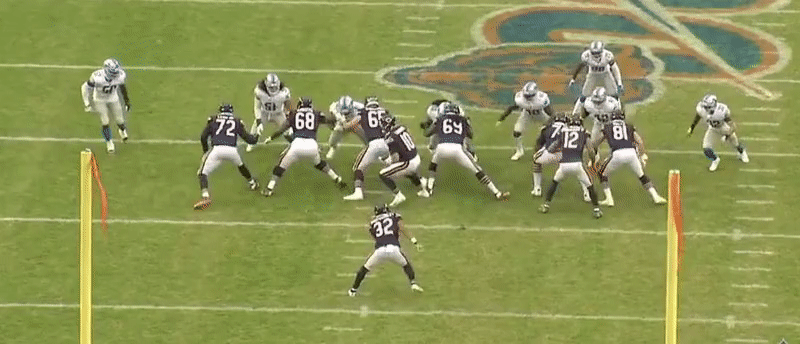
On the next series, the Lions brought the house, sending seven men after Trubisky. The risky call left Braunecker wide open on a crossing pattern, but the quarterback never saw him before Tavai got home unblocked off the right edge of Detroit's formation.
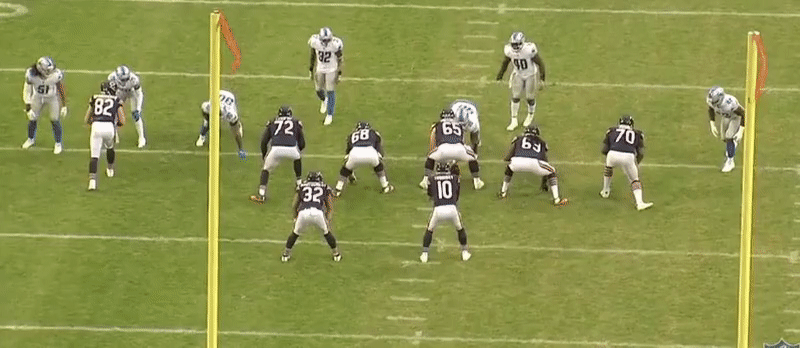
jdrogers@detroitnews.com
Twitter: @Justin_Rogers